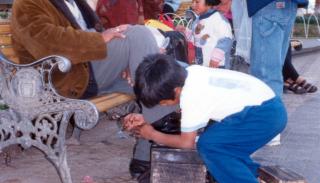
Breadcrumbs navigation
Poverty is not ‘another culture’: Against a right of children to work to live
Review of International Studies (RIS) Editor Martin Coward (University of Manchester) interviews authors Heloise Weber and Aliya Abbasi on their recent article. They critique Eurocentric perspectives that advocate for child labour and substantiate the argument by drawing on the case example of Bolivia, which lowered the legal age for child labour, only to eventually retract this decision. They demonstrate the link between neoliberal development and a rapid increase in the number of children forced to work to live since the 1980s.
Watch the interview below to get the key points and find out more about how the research came about.
You can read the full article at: https://doi.org/10.1017/S026021052200002X
This article is open access, however BISA members receive access to RIS (and our other journal European Journal of International Security) as a benefit of membership. To gain access log in to your BISA account and scroll down to the 'Membership benefits' section. If you're not yet a member join today.
Full article abstract
Well-being and protection of all children have widely been associated with universal rights. Simultaneously, though, there is growing advocacy for a right of children to work to live. Drawing on cultural relativist premises, such advocacy strongly correlates with an acceptance of poverty as a condition that is inevitable or simply ‘given’. We advance an argument against a right of children to work to live. The fact that only poor children are compelled to work should direct analyses to the causes of poverty. A critical engagement with the politics of development is necessary as it is often constitutive of relations of impoverishment. We critique Eurocentric perspectives that advocate for child labour and substantiate our argument by drawing on the case example of Bolivia, which lowered the legal age for child labour, only to eventually retract this decision. We demonstrate the link between neoliberal development and a rapid increase in the number of children forced to work to live since the 1980s. The case for a right of children to work to live is not justifiable; but there is a case for abolishing child labour and upholding the right of all children and their families to live in dignity. Poverty is not ‘another culture’.


